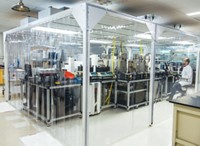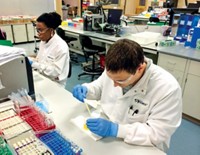Advertisement
Grab your lab coat. Let's get started
Welcome!
Welcome!
Create an account below to get 6 C&EN articles per month, receive newsletters and more - all free.
It seems this is your first time logging in online. Please enter the following information to continue.
As an ACS member you automatically get access to this site. All we need is few more details to create your reading experience.
Not you? Sign in with a different account.
Not you? Sign in with a different account.
ERROR 1
ERROR 1
ERROR 2
ERROR 2
ERROR 2
ERROR 2
ERROR 2
Password and Confirm password must match.
If you have an ACS member number, please enter it here so we can link this account to your membership. (optional)
ERROR 2
ACS values your privacy. By submitting your information, you are gaining access to C&EN and subscribing to our weekly newsletter. We use the information you provide to make your reading experience better, and we will never sell your data to third party members.
Business
Uncertainty Grows In The Golden State
With biotech struggling to recover, many chemists remain out of work in California
by Linda Wang
March 15, 2010
| A version of this story appeared in
Volume 88, Issue 11
The once-booming biotech industry in California lured many chemists to the state with promises of a diverse and vibrant work environment, and nice weather to boot. But growing unemployment in California is now forcing chemists to think twice about pursuing their dream jobs in the Golden State. By this past January, the state’s unemployment rate had risen to a staggering 12.5%—the fifth highest in the U.S.
Mergers and acquisitions in the pharmaceutical industry, a shift in focus from early-stage drug discovery to drugs further along in the pipeline, cutbacks in venture capital funding, and the outsourcing of R&D positions to India and China are all contributing to the loss of biotech jobs in California, explains Mary Canady, founder of the life sciences business development company Comprendia and the San Diego Biotechnology Network, an organization for biotech professionals.
Some chemists in California have been out of work for more than a year. Those who have found jobs are working in nontraditional areas such as regulatory affairs and medical diagnostics. Still others are considering moving out the state, and perhaps the country, altogether. Few chemists have found jobs equivalent to the ones they lost.
“The employment outlook in California is, in one word, gloomy,” says Marinda Li Wu, who cofounded the American Chemical Society California Section’s Career Assistance & Transition group with colleague Linda Wraxall. “Many chemists, both young and much older, have lost their jobs as companies continue to downsize,” she says.
ACS Discounts For Unemployed Chemists
Unemployed ACS members can apply for a special dues waiver by contacting ACS with their name and member number via e-mail at service@acs.org or by calling (800) 333-9511 or (614) 447-3776. The following are other benefits available to unemployed members:
National meeting registration: Free
Regional meeting registration: Reduced registration of $25
Harvard business courses: Enroll in one for $25, get three free
ACS Leadership Development System: Reduced rate
ACS Short Courses: 50% discount
ACS Member Insurance Program: Life insurance premiums deferred
For a full listing of benefits, visit www.acs.org/unemployed
Chemists waiting for the light at the end of the tunnel may not see it anytime soon. According to the 2010 California Biomedical Industry Report by the California Healthcare Institute and PricewaterhouseCoopers, 58% of California’s largest biomedical companies anticipate doing more R&D outside of the state.
California’s lawmakers are alarmed by the situation and are starting to take action. On Feb. 5, state assemblyman Jerry Hill (D-San Mateo) introduced legislation to support the creation of a director of California biotechnology retention and recruitment in the governor’s office. The director would be responsible for helping existing companies thrive in the state while also serving as a resource for new companies. “As lawmakers, we need to ensure that California doesn’t become to biotechnology what Michigan has become to the auto industry,” said Hill in a press statement.
Hill’s support of the biotech industry is encouraging, but any positive outcomes from this legislation may not come soon enough for unemployed chemists like Trudy Lionel, who was laid off in August 2009 from her position as manager of quality control at San Francisco-based Genentech. She lost her job shortly after the biotech giant merged with the big pharma firm Roche.
Lionel, who has a Ph.D. in chemistry and nearly 30 years of work experience, says she has applied for numerous positions in biotech and health care but hasn’t gotten any interviews. “It’s very tough,” she says. “Companies want to hire somebody who has exactly what they need, who can just come right in and do the job. Any kind of wiggle room is difficult.”
Alex Madonik, another Bay Area Ph.D. chemist, has been out of work since 2008, when he was laid off from his position as senior staff scientist at Celera. “In the biotech area, there are quite a lot of positions that are open, but I’m told by people who are hiring that they get a very large number of applicants for each one,” he says. “That’s what’s been discouraging.”
The ACS Career Fair, which will be held next week during the ACS national meeting in San Francisco, hopes to generate some leads for unemployed chemists, but so far, expectations are tempered. “We would normally expect about 100 companies to be recruiting at the career fair,” says David Harwell, assistant director of ACS’s Career Management & Diversity Programs. “But at the past two meetings, we’ve been below that. Quite frankly, I think we’ll be below that again.”
Nevertheless, Harwell encourages job seekers to continue pounding the pavement. “While all these numbers are not very cheery right now, you have to keep trying, and the career fair is where the odds are better than a lot of the options out there,” he says. Harwell encourages job seekers to take advantage of the career development workshops, résumé and cover letter reviews, and sessions with ACS career counselors. Unemployed ACS members can attend the national meeting for free.
Many companies exhibiting at the career fair are recruiting for positions outside of California. San Carlos, Calif.-based Nektar Therapeutics, for example, will be looking for a Ph.D. chemist to fill a position in their Huntsville, Ala., location. The candidate would serve as associate director of science and technology and oversee a group of 10 chemists, says Dorian Rinella, senior vice president of human resources and facilities operations at Nektar. Applicants should have strong leadership skills and more than 10 years of pharmaceutical experience.
Genentech, still one of the largest employers of chemists in the Bay Area, also plans to recruit chemists during the national meeting, but you won’t find their booth at the career fair. “Most of the people that we are interested in and are really focused on hiring are people who either come to us or that we find through our networking,” says Holly Butler, senior staffing manager at Genentech. “We’re trying to do some really targeted networking at the meeting. We’re approaching people we’ve chatted with in the past that we know are going to be there,” she adds.

The job market appears to be just as competitive for chemists searching for work in the San Diego area. “It’s probably the worst I’ve ever seen for chemists, and I’ve been in staffing for 13 years,” says Meredith Dow, a senior partner at San Diego-based Proven Staffing Consultants. “Normally, chemists would find jobs within two or three weeks. The problem is that a lot of companies here in San Diego have put their R&D on hold,” she explains.
Randy Smith, chair of the ACS San Diego Section, estimates that more than 11% of the roughly 3,000 chemists in the section are unemployed, and that’s a conservative number. He notes that the section typically posts three to four jobs in its monthly newsletter, but between July and December 2009, there wasn’t a single job posting. Only recently have positions started appearing again, but they’ve been in nontraditional areas such as sales, marketing, and business development.
Smith himself was laid off in April 2009 from his position as director of chemistry at contract research organization ChemVentures and was unemployed for more than seven months before landing his current position as a senior scientist at Illumina, a company developing systems to analyze genetic variation and biological function. “Moving from contract research aimed at medicinal chemistry into sequencing technology development was a fairly large leap,” he says.
While unemployed, Smith applied for positions in sales, field service, and technology transfer. He couldn’t find any positions similar to what he had before. “All the positions that I could find were no longer local,” he says. “They were all in India or China.” At Illumina, Smith says, he is one of roughly a dozen chemists in a company of biochemists and engineers doing product manufacturing.
Smith knows he needs to continually adapt to stay ahead of the game, so he’s gone back to school part-time to earn an M.B.A. “I look at that as an investment in my marketable and employable future,” he says. “I don’t trust that my Ph.D. is going to get me very far as a scientist.”

In fact, many chemists in California are being forced to consider alternatives in their job search. When chemist Tatiana Khasanova saw some of her colleagues at the contract research organization Nanosyn get laid off last year, she realized that she needed to start looking for a different job. She sent an e-mail to all her contacts asking them to keep her in mind for job openings. She was willing to consider any position that would use her skills as a medicinal chemist.
One of her colleagues told her about an opening for a clinical database curator at GeneGo, a provider of systems biology tools such as data mining and analysis. Khasanova convinced the hiring managers to give her a chance by selling her past experience working with databases. She also told the hiring managers that she had to reinvent herself many times in her career and that she was a fast learner. “The lucky part was that they really needed someone, and I was willing to give it a try,” she says. She began studying the material as soon as she got the job and was able to catch up within three months.
Khasanova has had to make some concessions “because you start in an area that you’re not an expert in,” but she considers herself lucky to be employed. She hopes to someday return to the bench. “I have to walk by the labs every day, and I look at the people wearing gloves and white coats. I definitely miss it,” she says.
Because Los Angeles and Orange County are less heavily focused on R&D and biotech, they weren’t as hard-hit as San Francisco and San Diego, says Harvey Yau, science product manager with Kelly Scientific Resources, a staffing services company. He’s starting to see some positions become available in manufacturing and quality control. He’s also seeing an increase in positions in regulatory affairs. “We do see a glimpse of recovery, but it is still extremely cautious at this point,” he says.
Some chemists are considering moving out of California to find work. Michael Levin, a San Diego-based synthetic chemist who was laid off from his position as senior scientist at Nanosyn in November 2009, says he has applied for positions in China. “I prefer to stay in California,” he says. “But if it’s the right position, I will definitely move.”
Levin moved to San Diego in 2000 when the biotech industry was booming. Since then, changing jobs every few years has become a way of life. He worked for San Diego-based Diversa (now Verenium) for four-and-a-half years before getting laid off. He soon found another position doing bioconjugation chemistry for SoluLink. After a year, he left the company to join Discovery Partners International. That company was later acquired by Biofocus and renamed Biofocus DPI. In November 2008, Biofocus DPI’s San Diego chemistry facility was sold to ChemVentures, which closed in 2009.
All this upheaval in the job market has people craving a sense of community. Canady says she has seen an increase in membership in the San Diego Biotechnology Network. In May, the group will host an event that will bring together unemployed biotech professionals who are interested starting their own companies. “Carve your own niche instead of looking for an opportunity that exactly fits your needs,” Canady says.
That’s what chemist Val Goodfellow did after he learned that his company, Biofocus DPI, was selling its San Diego facility to ChemVentures. In November 2008, Goodfellow left Biofocus DPI, where he was director of medicinal chemistry, to start Califia Bio. With funding from the National Institutes of Health, the San Diego start-up is developing drugs to treat neurodegenerative disorders associated with HIV and AIDS.
Starting a company may not be for everyone, but in this tough economy, it can’t hurt to have an entrepreneurial spirit. “I think people need to make their own career,” Goodfellow says. “If they’re going to wait for a large company to come and hire them and give them the job of their dreams, I don’t see that happening in the next several years here. People have to figure out what they can do and make something happen.”






Join the conversation
Contact the reporter
Submit a Letter to the Editor for publication
Engage with us on Twitter